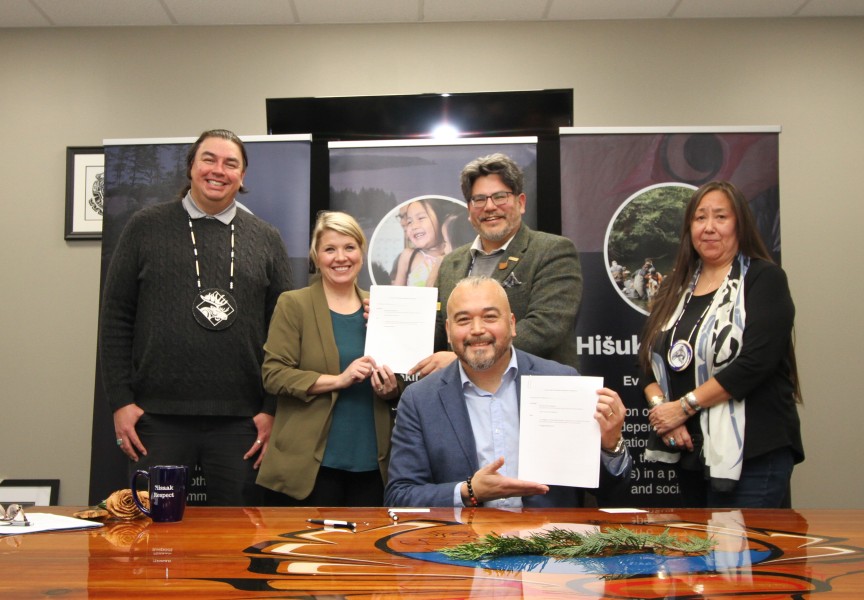The first claims for a system which provides funding across the country for those harmed by shortcomings in child welfare services will be eligible to be submitted in a few days.
Claims for compensation can be submitted starting March 10. This first claims period is for those in the Removed Child Class and the Removed Child Family Class.
These are two of the nine classes included in the First Nations Child and Family Services and Jordan's Principle Settlement, which was approved by federal court in October of 2023.
The $23.34 billion agreement was reached following a 2019 compensation order from the Canadian Human Rights Tribunal. The agreement helped address systemic discrimination against First Nations children and their family members.
The agreement was intended to compensate those who suffered from underfunding of the First Nations Child and Family Services Program.
Those eligible to submit claims this month include First Nations individuals who were removed from their homes as children between April of 1991 through March of 2022. These claimants must have been living on reserve or in the Yukon and placed into care funded by Indigenous Services Canada. Their caregiving parents or grandparents may also be eligible for compensation.
“Class Members can take steps now to prepare for when the Claims Period opens,” said David Sterns, a member of the Settlement Implementation Committee and a partner of the Toronto-based law firm Sotos LLP. “If you are planning to submit a claim, we encourage you to start getting ready for the Claims Period by making sure you have government-issued identification and a mailing address. You should also have a bank account in your name so that the administrator can deposit compensation directly into your account.”
First Nations established Jordan’s Principle in response to the death of Jordan River Anderson, who was a member of Norway House Cree Nation in Manitoba.
Jordan died in 2005 at the age of five. He spent the majority of his life in hospital, while federal and provincial governments bickered over who was responsible to cover his home care costs.
Patty Hajdu, Canada’s minister of Indigenous Services, issued a statement last month detailing the federal government’s position.
“When it comes to Jordan’s Principle, our top priority and our intention have not changed: making sure First Nations children have access to the products, services and supports that they need,” she said.
Hajdu said requests for Jordan’s Principle funding have grown rapidly since first implemented in 2016. Those requests have been especially growing in recent years.
In 2021-22, there were 614,350 requests approved. And by 2023-24 almost three million requests were approved.
Hajdu said government officials have implemented new ways to process requests going forward, to speed up decision making and to help address the demand.
“In light of the increased volume, the Government of Canada has made changes to operating procedures to make sure requests align with the long-term sustainability of Jordan’s Principle,” Hajdu said. “These changes provide further clarity and consistency around the services available for First Nations children through Jordan’s Principle, as well as the required documentation that is needed when processing requests.”
Last year the federal government was once again front and centre at the Canadian Human Rights Tribunal, facing allegations including of mismanagement and delays implementing the system.
Officials with the Canadian government argued people were abusing the system by labelling requests as urgent, which helped create the backlog.
Some of the requested urgent items included laptops, elite sports fees, gaming consoles, a zipline kit, a television and a lawn mower.
The federal government has been challenging a recent court order which requires it to immediately address its backlog of about 140,000 requests for Jordan’s Principle funding.
Hajdu said funding requests should not be made for areas outside of what the principle was designed for.
“It’s not within the spirit of why Jordan’s Principle was created in the first place,” she said.
But some advocates believe the program’s users are not the ones to blame.
“Instead of complying with legal orders, Canadian government officials have recently suggested, that there is widespread misuse of Jordan’s Principle,” said a statement released last month by the First Nations Child and Family Caring Society.
This society is a national organization whose mandate is to ensure the safety and well-being of First Nations youth and their families.
“The federal government alleges misuse but has not produced any credible data on the nature and extent of the problem,” the society said. “Instead, we see Canada shifting and deflecting its legal responsibility by alleging misuse. Using harmful stereotypes to legitimize discrimination is a hallmark of systemic racism.”
Since its inception in 2016, almost $8.8 billion in Jordan’s Principle funding has been announced. More than 8.7 million products, services and supports have been approved during this time.
“Our work has not stopped and we remain focused on making sure that First Nations children have equal access to the public services they need,” Hajdu said.
Information about submitting a Claim for compensation under to the First Nations Child and Family Services and Jordan’s Principle Settlement is available at FNChildClaims.ca. Or people can call 1-833-852-0755.
Claims will also be accepted on behalf of individuals who have died. Those who are eligible to submit claims are those who have been appointed the estate executor or the administrator of the estate.
Those who meet certain requirements as a family member considered to be an heir are also eligible.
It has yet to be announced when the claims period for the seven other classes in the settlement agreement will be open for submissions. These classes will be opened in phases.








